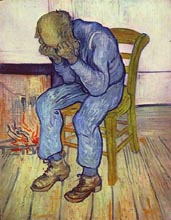What Is Depression?

Depression is a "whole-body" illness, involving your body, mood, and thoughts. It affects the way you eat and sleep, the way you feel about yourself, and the way you think about things. Without treatment, symptoms can last for weeks, months, or years. Appropriate treatment, however, can help most people who suffer from depression.
Depressive signs and symptoms are characterized not only by negative thoughts, moods, and behaviors but also by specific changes in bodily functions (for example, crying spells, body aches, low energy or libido, as well as problems with eating, weight, or sleeping). The functional changes of clinical depression are often called neurovegetative signs. This means that the nervous system changes in the brain cause many physical symptoms that result in diminished participation and a decreased or increased activity level.
Depression is highly treatable in the vast majority of cases. Up to 90% of depressed people respond positively to one treatment or another. Sometimes psychotherapy or counseling is all that is needed, but there is also a wide array of effective antidepressant medications and other alternatives.
|